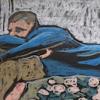“YOU WOULDN’T UNDERSTAND”:
Thinking About “Low Cultures” with Adolescents
 Within the psychic space of youth, interests come to define one’s sense of self. These idiosyncratic obsessions, whether bands, internet memes, or comic books, are often subtly characterized as unimportant within psychoanalysis, while other cultural interests are elevated. This creates a cultural divide between therapists and clients that can limit the therapist’s ability to engage with children.
Within the psychic space of youth, interests come to define one’s sense of self. These idiosyncratic obsessions, whether bands, internet memes, or comic books, are often subtly characterized as unimportant within psychoanalysis, while other cultural interests are elevated. This creates a cultural divide between therapists and clients that can limit the therapist’s ability to engage with children.
When our clients’ interests intersect with our own, it can imbue the dyad with a sense of mutuality. However, when we have the feeling that we can’t get it, it raises concerns about how we can relate to our client. Can we as therapists leave behind our higher viewpoint and embrace “low culture” as a vehicle for connection?
In this course, we will explore ways to approach these cultural divides, using case examples and ideas drawn from queer studies and contemporary relational psychoanalysis, as well as manga, basketball, hip-hop, and other “low culture” places.
At the conclusion of this course participants will be able to:
- Analyze clinical material from low cultures from a psychodynamic perspective.
- Describe new ways to connect with adolescent patients through the integration of low cultures in treatment.
- Discuss the ways in which low cultures may be undervalued and unexamined in work with children/adolescents.
- The Efficacy of Psychodynamic Psychotherapy by Jonathan Schedler (2009). American Psychologist
- Psychodynamic psychotherapy for children and adolescents: a critical review of the evidence base by Midgely, N. & E. Kennedy (2011). Journal of Child Psychotherapy, vol 37 (3).
- Short-term Psychoanalytic Child Therapy for Anxious Children: A Pilot Study by Gottken et al. (in Psychotherapy, 2014, v. 51 No 1, pp. 148-58)
David Cushman, Psy.D., is a licensed clinical psychologist. He is a staff clinician and supervisor at RAMS Inc., a community mental health clinic in San Francisco, and has a private practice in Oakland, where he sees children, teens, adults, and couples.
Loong Kwok, Psy.D., is the Director of Child Services at Access Institute, where he teaches and supervises school-based therapy. He works with adults, children, and couples at Baywell Psychiatry Group. He also serves on the Editorial Committee of fort da, NCSPP’s journal, and the Neuropsychoanalysis Committee of PINC.
Enrollees who cancel at least SEVEN DAYS prior to the event date will receive a refund minus a $35 administrative charge. No refunds will be allowed after this time. Transfer of registrations are not allowed.
For program related questions contact Julia Conant at drjuliaconant@gmail.com or 415-857-4885.
For questions related to enrollment, locations, CE credit, special needs, course availability and other administrative issues contact Michele McGuinness by email or 415-496-9949.
Education Committee
The Education Committee is responsible for the development of a variety of courses and workshops given throughout the year in San Francisco and the East Bay.

